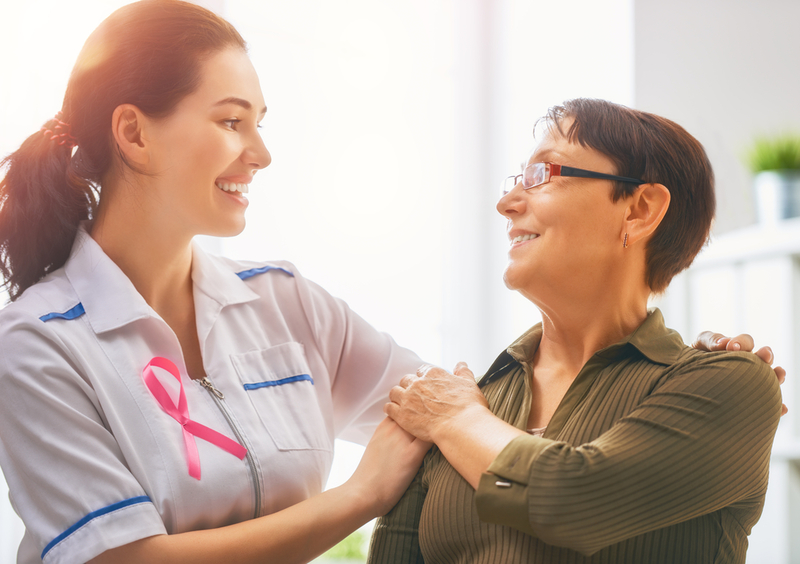Global HER2 Testing Survey Raises Questions About Priorities for Breast Cancer Resources
ESMO Breast Cancer Congress 2019 Press Release May 07, 2019
A global survey of HER2 testing has raised questions about how resources should be spent on potentially lifesaving HER2 targeted therapies for breast cancer, especially in poorer countries. The results were presented at the ESMO Breast Cancer congress 2019, Berlin, 2-4 May 2019.

The ONCOLLEGE-001 internet-based survey of HER2 testing in 45 countries has highlighted major access and affordability issues in low and middle income countries (LMICs), with some issues extending to upper middle income countries (UMIC) too.
“Even when HER2 testing was available, it was too expensive and inaccessible for many women, suggesting that governments need better information to set planning priorities for investing in infrastructure, testing and treatment,” said study author, Dr Sara Altuna, Department of Medical Oncology, Unidad Oncológica Venezuela CA and Oncomédica CA, Caracas, Venezuela.
In the survey, 42% of respondents from UMICs and 34% from LMICs reported that HER2 testing was available only in a private setting or abroad, compared to 5% of those working in high income countries (HICs). Thirty per cent of LMIC respondents reported significant affordability issues related to HER2 testing, compared to 12% of respondents from UMICs and none from HICs.
“You can have the microscopes, the antibodies and probes and the certified laboratories, but if patients cannot afford the tests or do not have insurance, they won’t be done,” added Altuna.
HER2 testing is needed to identify the 15-20% of women with breast cancer who have HER2-positive disease, so they can receive anti-HER2 treatment with trastuzumab - which has been on the World Health Organization’s List of Essential Medicines since 2015 - and other HER2 targeted therapies.
Commenting for ESMO, Dr Fatima Cardoso, Director of the Breast Unit of the Champalimaud Clinical Center in Lisbon, Portugal, explained that in recent decades HER2-targeted therapies have transformed the outcomes for women with the HER2 sub-group of breast cancer from the worst to some of the best.
“Without accurate, high quality HER2 testing, women with HER2-positive tumours may miss out on potentially lifesaving treatment. There is also a risk that women with HER2-negative tumours may be exposed to the toxicity and unnecessary expense of HER2 treatment they don’t need. We don’t want to spend resources on treating tumours that won’t respond to HER2 targeted therapies,” she said.
Cardoso pointed to the lack of basic pathology services in some low income countries, with women undergoing mastectomy for benign breast lumps because biopsy services were not available to make the diagnosis before surgery. She also questioned the wisdom of spending resources on HER2 testing if anti-HER2 therapy is unavailable or unaffordable.
“Testing and treatment must go hand in hand. If you have access to anti-HER2 treatment, it makes sense to spend money on testing. But if you already know there is no access to treatment, it is debatable whether to use resources for HER2 testing. Let’s first focus on ensuring that treatment is available as recommended by the WHO, by ESMO’s and other international guidelines, for both primary and metastatic HER2-positive breast cancer,” she said.
“ONCOLLEGE-001 is an important study in raising awareness of the heterogeneity of availability and quality of HER2 testing. The results probably underestimate the access and affordability problems facing many patients, and not just in medium and low income countries. But they remind us of the need for clinicians, regulators and governments to work together in addressing these inequalities,” said Cardoso.
An ongoing ONCOLLEGE-001 analysis is investigating global prioritisation and access to anti-HER2 medicines, and, as Altuna concludes, such research demonstrates the value of international cooperation: “We have shown it is possible to create a network of clinicians from very different countries to share practice and experiences and paint a picture of what is really happening in breast cancer care around the globe, so we can identify where improvements are most needed.”
This article is a press release of a study presented at the ESMO Breast Cancer Congress 2019. Read the original here.
-
Exclusive Write-ups & Webinars by KOLs
-
Daily Quiz by specialty
-
Paid Market Research Surveys
-
Case discussions, News & Journals' summaries